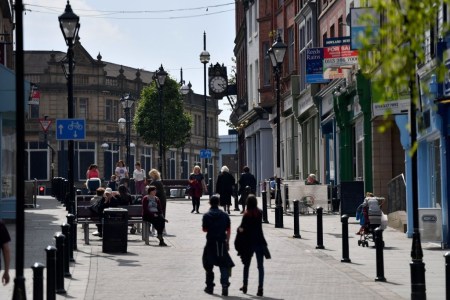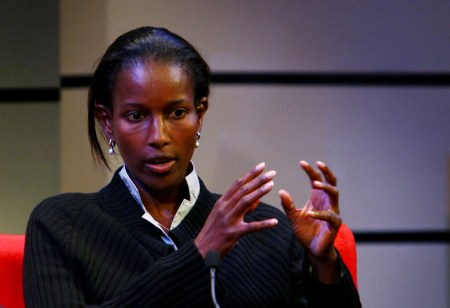Persecution of Alevis in Turkey: Threats, Arbitrary Arrests, Gatestone Institute, Uzay Bulut, January 18, 2018
Alevis are a religious minority Turkey with a distinct faith, philosophy, and culture that largely upholds secularism and humanism. Turkey’s Alevi community is estimated in the tens of millions — up to 25% of the population, making up the country’s largest minority. But the number is only an approximation, because legally, Alevis in Turkey are “non-existent”. The Turkish government does not officially recognize them, so it does not include them in a census and counts them as “Muslims.
******************************************
Just like the Christian, Jewish, and Yazidi communities in Turkey, Alevis have also been victims of Islamic supremacism for centuries — both in the Ottoman Empire and in the Republic of Turkey.
In Istanbul, the door of an Alevi family was vandalized with a red symbol. “Get out, heathen” and “Islam” were written on the door.
Turkey’s membership in the NATO since 1952, its negotiations for full membership to the EU since 2005, and its countless military, economic, and diplomatic agreements with the West, have done nothing to reduce the persecution against religious minorities in the country.
Pressures against the Alevi community in Turkey are becoming alarmingly commonplace.
Just like the Christian, Jewish, and Yazidi communities in Turkey, Alevis have also been victims of Islamic supremacism for centuries — both in the Ottoman Empire and in the Republic of Turkey.
Alevis are a religious minority Turkey with a distinct faith, philosophy, and culture that largely upholds secularism and humanism. Turkey’s Alevi community is estimated in the tens of millions — up to 25% of the population, making up the country’s largest minority. But the number is only an approximation, because legally, Alevis in Turkey are “non-existent”. The Turkish government does not officially recognize them, so it does not include them in a census and counts them as “Muslims.”
Recently, officials at the Istanbul airport seized the passport of Fatma Tunç, the wife of a dissident author, Aziz Tunç. Mrs. Tunç was preparing to board a plane to Germany when she was told by officials that her passport has been cancelled because “there are dangerous people in her family” and that for her to travel outside of Turkey, her husband and son would have to return. Aziz Tunç’s passport has also been cancelled due to his being prosecuted at a political trial in Turkey.
Mr. Tunç, a columnist and the author of two books about the 1978 Alevi massacre in the city of Maraş in southeastern Turkey, and his son, have been living in exile in Germany for the past two years, as a result of government persecution. “This is downright hostage-taking,” he said.
“It is illegal, immoral, and inhumane. This has not only been done to me. This has been done to many people in Turkey… As can be seen, there is… unrestrained tyranny [in Turkey]. And we are forced to live in exile because we express these things. And we are punished like this.”
Pressures against the Alevi community in Turkey take several forms — such as mass murders, the lack of official recognition of their places of worship, and arbitrary arrests. Particularly since the failed coup d’état against Turkish President Recep Tayyip Erdogan in 2016, many Alevis have been arrested for allegedly having ties with something the Turkish government calls the “Fethullah Terrorist Organization” (FETO), naming it after Islamic cleric Fethullah Gülen, who has for years been living in exile in Pennsylvania since 1999. The Turkish government after accuses Gülen of organizing the attempted coup.
Other examples of the persecution of Alevis include:
Erkan Topçu, a high school teacher and the head of the Mürteza Alevi Bektashi Education and Culture Association in the city of Isparta, for example, was arrested within the investigation of the coup for “being a member of FETO” in October 2016.
Also in October, 2016, Hasan Ateş, an Alevi dede (faith leader) in the city of Izmir, was also arrested for being a member of FETO and for “using Bylock”, an encrypted messaging app, which has been linked to FETO by the government.
Unfortunately, the government’s crackdown on Alevis has been escalating; now, Alevi journalists are also targeted. TV10, the television channel known as “the voice of Alevis”, was closed down in September 2016 after the failed coup, allegedly “for threatening national security and belonging to a terror organization.”
Two officials of the Alevi-run TV10, Veli Büyükşahin and Veli Haydar Güleç were arrested on January 10. Recently, Kemal Demir, an employee of TV10, was also arrested.
“These detentions and the government’s intentional harassment of the Alevi media have no meaning other than attempting to shape the Alevi media,” said Şükrü Yıldız, former chairman of TV10, and called the arrests “an attack against the Alevi faith and resistance.”
Alevi citizens are also threatened inside their homes: red crosses and threatening graffiti are drawn on their doors and walls.
Last November, unknown perpetrators painted red crosses on the front doors of 13 Alevi homes.
A week later, in Bahçelievler district of Istanbul, the door of another Alevi family was marked with a similar red symbol. “Get out, heathen” and “Islam” were also written on the door.
The vandalism of Alevi homes concern the Alevi community, to say the least; they have been exposed to many massacres and pogroms in Turkey. These include but are not limited to the 1921 Kocgiri Massacre, 1937-1938 Dersim (Tunceli) Massacres, 1938 Erzincan Zini Gedigi Massacre, 1978 Malatya Massacre, 1978 Sivas Massacre, 1978 Maras Massacre, 1980 Corum Massacre, 1993 Sivas Massacre and 1995 Istanbul, Gazi Quarter Massacre.
 The faces of many of the victims who were murdered in the 1993 Sivas massacre are featured on this poster, used in a 2012 commemoration in Germany. (Image source: Bernd Schwabe, Wikimedia Commons)
The faces of many of the victims who were murdered in the 1993 Sivas massacre are featured on this poster, used in a 2012 commemoration in Germany. (Image source: Bernd Schwabe, Wikimedia Commons)
Alevis were victims of other physical attacks in Ortaca, Mugla in 1966, in Elbistan, Maras in 1967, in Hekimhan, Malatya in 1968, and in Kirikhan, Hatay in 1971, among others. During these massacres or pogroms, many Alevi residents were murdered or had to flee their cities.
“If you go to the Kizilay city center in Ankara today and ask people if they are Alevis, the majority will deny it,” said Kemal Bulbul, an Alevi author and rights activist, explaining that Alevis hide their identity due to the systematic persecution and discrimination Alevis they have suffered.
“For what has been experienced cannot be erased from memories. Alevis were not only massacred in Yozgat, Tokat, Amasya, but also in Thrace and the Mediterranean. The Alevi dargahs (shrines built over the graves of revered religious figures) have been raided, plundered, burnt down, and destroyed.”
Alevism: A faith outside Islam
The founding government of the Republic of Turkey, led by Mustafa Kemal Atatürk, banned Alevism and its places of worship in 1925, while institutionalizing Sunni Islam through the establishment of Diyanet (Directorate of Religious Affairs) in 1924. The Diyanet was, and still is, a major violation of secularism. Since that ban, Alevism has not been officially recognized; Alevis have been deprived of religious liberty and freedom of expression regarding their faith.
Alevism is a distinct religion, philosophy and culture, the existence of which predates Islam. Alevism upholds secularism and humanism. A common misconception about Alevism is that it is a sect or an interpretation of Islam.
A group of Alevi dedes and pirs (faith leaders) carried out a workshop on Alevism in the city of Dersim (Tunceli) in 2015; there, they agreed that Alevism is a faith outside Islam.
Mustafa Genç, an Alevi dede (faith leader), one of the Alevi representatives who attended the workshop, said that Alevism and Sunni Islam “are never on the same line”:
“In Sunnism, they pray five times a day and fast for a month. These things do not exist in the Alevi faith. According to our faith, God is in the human and not in the sky. In the Alevi faith, women are sacred and to divorce a woman is the most difficult thing. This is not the case in Sunnism. Sunni Muslims think a man can marry four women.”
The prominent Alevi scholar Mehmet Bayrak also emphasizes that Alevism is a distinct religion, separate from Islam.
“As our people [in Turkey] only think of divine religions when religion is discussed, they cannot comprehend that Alevism is a distinct religion. They immediately ask ‘Who is the Allah and prophet of Alevism?’. However, there is a category called natural religions and they still exist. And Alevism is one of them.”
Bayrak explains that Alevism took certain things from other religions and gave certain things to them and is much closer to Christianity than to Islam.
“For example, one cannot see one tenth of the similarity between Alevism and Christianity in the similarity between Alevism and Islam…. Islam has a history of at least 1400-1500 years and they [Alevis and Muslims] have lived side by side or with one another in this area. So, Alevism took some motifs from Islam and melted them within itself. For example, there is a massive difference between the culture of Ali in Alevism and the Ali in Islam. Alevism created a new, distinctive cult of Ali.”
Bayrak lists some of the differences between Alevism and Islam:
“Islam has five pillars. Alevism do not practice any of them. For example, Alevis fast but it is completely different from the fasting in Islam. Alevis do not do pilgrimage [to Mecca], they do not say shahada[the Islamic declaration of faith]. And Alevis do not do salah [five daily prayers] … For someone to be a Muslim, they should also accept the requirements of faith (iman). Muslims say, ‘I believe in the God of Islam and its prophet; I believe in the book of Islam; I believe in the afterlife; I believe benevolence and evil come from Allah.’ Alevis do not believe any of these things. They carry out neither the pillars nor the requirements of faith of Islam. So, Alevism is a distinct faith. And it is completely wrong to see Alevism as an entity, version, denomination or sect of Islam.”
According to Bayrak, one of the reasons why some Alevis say they are Muslim is their misconceptions about their own religion. “Due to the centuries-long propaganda they have been exposed to, some of them think that they are true Muslims,” says Bayrak, and adds that a more alarming reason for their denial is fear of persecution.
“As Alevis are still under political, social, and cultural pressures, they are still scared of saying that Alevism is outside of Islam. It is impossible for them to express themselves freely.”
Turkey’s membership in the NATO since 1952, its negotiations for full membership to the EU since 2005, and its countless military, economic, and diplomatic agreements with the West, have done nothing to reduce the persecution against religious minorities in the country.
Uzay Bulut is a Turkish journalist born and raised in Turkey. She is presently based in Washington D.C.











Recent Comments